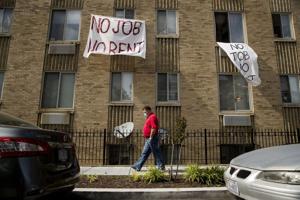Oregon study proposes eviction moratorium last until state helps all

(The Center Square) – A taxpayer-funded study from Portland State University suggests Oregon’s potential wave of evictions should be put on indefinite hold because it could cost up to $4.7 billion.
The study released this month projects the downstream costs of evictions using a Cost of Eviction Calculator from the University of Arizona’s College of Law. Its estimates are based on data collected from Oregon homeless shelters, inpatient and emergency medical services and child welfare services, among others. It concludes evictions could cost taxpayers between $720 million and $4.7 billion.
“If we want to be truly responsible, we should allow everyone to stay in their homes while we figure out how many still need rent assistance and whether they can access that assistance,” said PSU Associate Professor Marisa Zapata.
According to PSU researchers, this new study evaluated system costs for renters who had zero confidence in paying their next month’s rent, a metric not included in the previous study from February. That prior study pegged the costs of mass evictions at $3.3 billion, and total back rent could total up to $378 million.
Oregon’s statewide eviction moratorium ended on Wednesday, leaving thousands of tenants liable for overdue rent under the threat of eviction, at least on paper. The Biden administration’s extension of the federal eviction moratorium in June protected Oregonians from eviction notices through July 31.
The study authors wrote that their estimates do not account for other impacts of eviction like academic achievement gaps and lifetime earnings. In addition, their numbers do not take into account the existing state programs set up since 2020.
It also doesn’t account for the economic impact to property owners, commonly stereotyped as corporate real estate management agencies whose only consequence is lower profits. According to Census data from 2015, 22.7 million rental properties, nearly half of the nation’s inventory, are owned by individuals who commonly own three or fewer units.
Violet Wilson, a landlord in Keizer, says the longer the state outsources the costs to housing managers like herself, the more are doomed to leave the market. In June, she told lawmakers that one tenant of hers left without a forwarding address and owed $8,000 in back rent.
“Mainly, I manage single family homes and a number of my owners are selling because they cannot deal uncertainty of Oregon landlord law,” Wilson said. “I have sent information to my tenants letting them know of the resources over months. Often, it has taken multiple times for them to reach out for help.”
Estimates on many Oregon tenants are behind on rent is hard to calculate. The U.S. Census Bureau projected in May that at least 17% of tenants or more than 101,700 people were unsure about making rent. A survey from the Multifamily Northwest, a landlord association, estimated 13.2% of Oregon tenants missed a rent payment in the second week of May—down from 14.1% in April.
Nationwide, most tenants are paying rent. A National Multifamily Housing Council report from May showed 94.6% of its 11.7 million tenants paid rent month.
A host of eleventh-hour legislation passed by the Oregon Legislature gave Oregonian tenants additional protections through this summer and beyond. Tenants will have until Feb. 28, 2022, to catch up on unpaid balances and an extra 60 days free from eviction if they are waiting on an application for rental assistance. Oregon’s $150 million Landlord Compensation Fund will see its third round of payments this month. Another $84.5 million has been paid out by the Oregon Emergency Rental Assistance Program to date.
Meanwhile, the state has been slow to offer help to thousands of tenants. On June 14, Oregon Housing and Community Services Executive Director Margaret Salazar reported to state lawmakers that the OHCS had paid out $183 million in federal dollars to 43,230 households. The remaining $423 million, Salazar said, has been bogged down by paperwork and technical glitches. In June, another 16,679 households started or completed rental assistance applications.
“The July 1st deadline and the crushing level of need are a fundamental mismatch to the ability of our systems to scale rapidly to that need,” Salazar said.
When mass evictions do hit Oregon, according to Portland lawyer Michael Fuller said most indebted tenants would have one option left: bankruptcy.
“They should know that bankruptcy may be a viable option for them to stay on their property, wipe out the past rent and make their payments moving forward,” Fuller said. “As long as they filed for bankruptcy before the landlord gets their eviction judgment, they’re generally protected.”
Under Oregon law, tenants are at a disadvantage in court. Landlords are entitled to compensation for their legal fees should they win. Tenants are not. Fuller says that leaves little chance of many successful challenges in the near future. A bill introduced by state Rep. Karin Power, D-Milwaukie, in 2018 would have allowed courts to award attorney fees to victorious tenants in rental cases.
Disclaimer: This content is distributed by The Center Square


